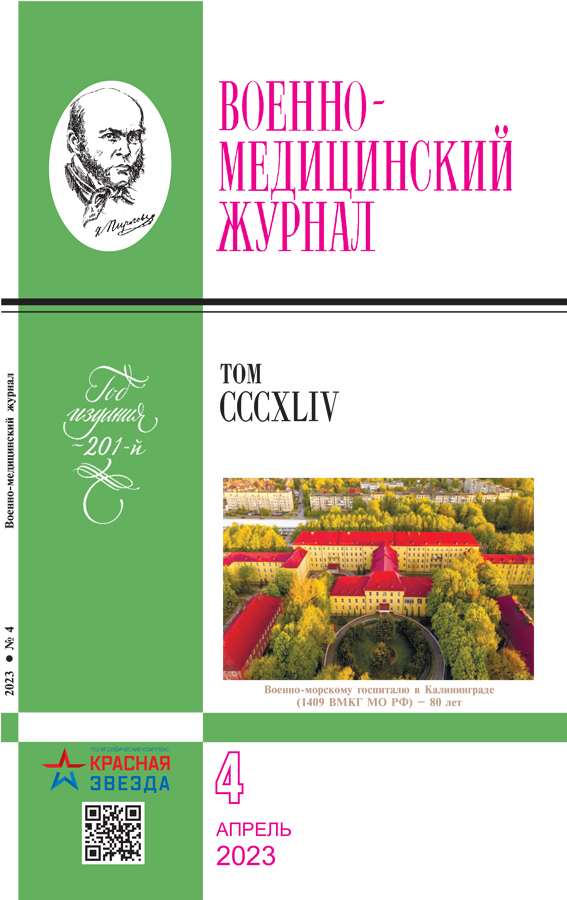Staged treatment of the Mirizzi syndrome Type 4, complicated by obstructive jaundice and acute cholangitis, in the COVID-19 pandemic
- Authors: Svyatnenko A.V.1,2, Demko A.E.1,2, Osipov A.V.1,2, Surov D.A.1,2, Kokorin V.V.3
-
Affiliations:
- The I.I.Dzhanelidze Research Institute of Emergency Medicine of the Ministry of Health of the Russian Federation
- The S.M.Kirov Military Medical Academy of the Ministry of Defense of the Russian Federation
- The P.V.Mandryka Central Military Clinical Hospital of the Ministry of Defense of the Russian Federation
- Issue: Vol 344, No 4 (2023)
- Pages: 30-34
- Section: Treatment and prophylactic issues
- URL: https://journals.eco-vector.com/0026-9050/article/view/630201
- DOI: https://doi.org/10.52424/00269050_2023_344_4_30
- ID: 630201
Cite item
Abstract
With the timely diagnosis of the Mirizzi syndrome, approaches to treatment consist of the staged elimination of complications and appropriate surgical intervention. In a pandemic, there is a high risk of a patient becoming infected and being transferred to a hospital with an infectious profile, which can cause great difficulties in the treatment of unresolved complications of the underlying disease against the background of a viral infection and adversely affect the outcome. In a pandemic, biliary decompression in patients with Mirizzi syndrome and obstructive jaundice should be performed as soon as possible in a specialized center. This allows you to perform the second stage, aimed at eliminating the cause of the biliary block after rehabilitation of a viral disease. The optimization of emergency specialized surgical care should be based, first, on clear patient routing, the use of minimally invasive technologies, and the principles of staged treatment with the maximum use of all available resources.
About the authors
A. V. Svyatnenko
The I.I.Dzhanelidze Research Institute of Emergency Medicine of the Ministry of Health of the Russian Federation; The S.M.Kirov Military Medical Academy of the Ministry of Defense of the Russian Federation
Author for correspondence.
Email: osipov@emergency.spb.ru
Russian Federation, St. Petersburg; St. Petersburg
A. E. Demko
The I.I.Dzhanelidze Research Institute of Emergency Medicine of the Ministry of Health of the Russian Federation; The S.M.Kirov Military Medical Academy of the Ministry of Defense of the Russian Federation
Email: osipov@emergency.spb.ru
заслуженный врач РФ, профессор, полковник медицинской службы запаса
Russian Federation, St. Petersburg; St. PetersburgA. V. Osipov
The I.I.Dzhanelidze Research Institute of Emergency Medicine of the Ministry of Health of the Russian Federation; The S.M.Kirov Military Medical Academy of the Ministry of Defense of the Russian Federation
Email: osipov@emergency.spb.ru
доцент
Russian Federation, St. Petersburg; St. PetersburgD. A. Surov
The I.I.Dzhanelidze Research Institute of Emergency Medicine of the Ministry of Health of the Russian Federation; The S.M.Kirov Military Medical Academy of the Ministry of Defense of the Russian Federation
Email: osipov@emergency.spb.ru
доктор медицинских наук, доцент, полковник медицинской службы
Russian Federation, St. Petersburg; St. PetersburgV. V. Kokorin
The P.V.Mandryka Central Military Clinical Hospital of the Ministry of Defense of the Russian Federation
Email: osipov@emergency.spb.ru
кандидат медицинских наук, подполковник медицинской службы
Russian Federation, MoscowReferences
- Есипов А.В., Абушинов В.В., Алехнович А.В. Новые требования к внутреннему контролю качества и безопасности медицинской деятельности: пути и инструменты их реализации в многопрофильном стационаре (сообщение первое) // Госпит. медиц.: наука и практика. – 2021. – Т. 4, № 1. – С. 45–53.
- Есипов А.В., Абушинов В.В., Алехнович А.В. Новые требования к внутреннему контролю качества и безопасности медицинской деятельности: пути и инструменты их реализации в многопрофильном стационаре (сообщение второе) // Госпит. медиц.: наука и практика. – 2021. – Т. 4, № 2. – С. 64–71.
- Есипов А.В., Алехнович А.В., Абушинов В.В. Covid-19: первый опыт оказания медицинской помощи и возможные решения проблемных вопросов (обзор) // Госпит. медиц.: наука и практика. – 2020. – № 1. – С. 5–8.
- Пугаев А.В., Гараев Ю.А., Алекперов С.Ф. и др. Лечение синдрома Мириззи // Хирургия. Журн. им. Н.И.Пирогова. – 2019. – № 3 (1). – С. 42–47. doi.org/10.17116/hirurgia201903142
- Ahlawat S.K., Singhania R., Al-Kawas F.H. Mirizzi syndrome // Curr. Treat. Options Gastroenterol. – 2007. – Vol. 10, N 2. – P. 102–110. doi: 10.1007/s11938-007-0062-7. PMID: 17391625.
- Chen H., Siwo E.A., Khu M., Tian Y. Current trends in the management of Mirizzi Syndrome: A review of literature // Medicine (Baltimore). – 2018. – Vol. 97, N 4. – P. e9691. doi: 10.1097/MD.0000000000009691. PMID: 29369192; PMCID: PMC5794376.
- Clemente G., Tringali A., De Rose A.M. et al. Mirizzi Syndrome: Diagnosis and Management of a Challenging Biliary Disease // Can. J. Gastroenterol. Hepatol. – 2018. – Vol. 12. –P. 6962090. doi: 10.1155/2018/6962090. PMID: 30159303; PMCID: PMC6109484.
- Csendes A., Diaz J.C., Burdiles P. et al. Mirizzi syndrome and cholecystobiliary fistula: a unifying classification // Br. J. Surg. – 1989. – Vol. 76. –P. 1139–1143.
- Mirizzi P.L. Sindrome del conducto hepatico // J. Int. Chir. – 1948. – N 8. – P. 731.
- Valderrama-Treviсo A.I., Granados-Romero J.J., Espejel-Deloiza M. et al. Updates in Mirizzi syndrome // Hepatobiliary Surg. Nutr. – 2017. – Vol. 6, N 3. – P. 170–178. doi: 10.21037/hbsn.2016.11.01. PMID: 28653000; PMCID: PMC5474450.
Supplementary files







